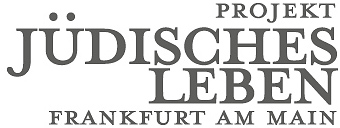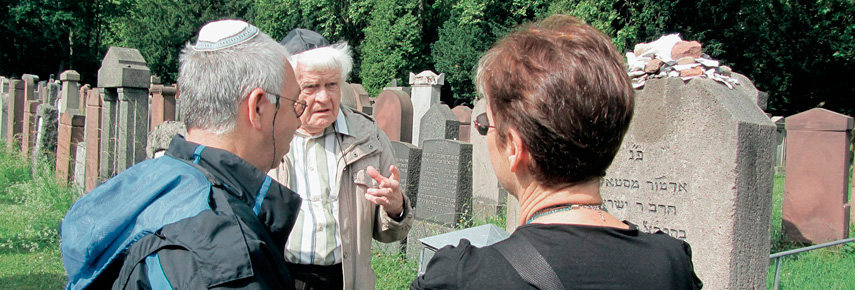Biographical Notes
Name:
Ralph Penglis
Participation in the Visiting Program: 2012
Name at Birth:
Ralf Kiefer
Born:
1936 in Frankfurt, Ostend, Sandweg
Emigration:
in 1937 with his family to Australia
Parents:
Hans and Frieda Kiefer
Grandparents (Father’s Line):
Hedwig and Moritz Kiefer; had a shop near by the Konstablerwache
School of Father and Aunt of Ralph Penglis:
Philantropin
Descendants:
One son of Ralph Penglis lives in Australien
Sources:
Correspondence with an talk to Ralph Penglis and Estelle Dzienciol
Projekt Jüdisches Leben in Frankfurt (PJLF): Recording of the meeting at Gagern-Gymnasium
Vertriebene zu Gast. Flüchtlinge und deren Kinder besuchen Frankfurt, FAZ vom 01.06.2012
Photos und Documents:
Estelle Dzienciol and Ralph Penglis
Heinrich von Gagern-Gymnasium, Iris Hofmann, Angelika Rieber
Text:
Marianne Karpf
Translation:
Geoffrey Robertsand Georgette Brock
Ralph Penglis
Australia meets Germany
by Marianne Karpf
Ralph Penglis, born in Sandweg in the Frankfurt Ostend as Ralf Kiefer, emigrated in 1937 together with his family. His parents, his grandmother and himself found shelter in Australia. His first language is German, however, as in the beginning the family talked German in Australia, too. But looking back to his life, he states a little uneasily: “I am nothing what I was born – Ich bin ein anderer Mensch!“
h3. „I am half German half Greek“
Ralph Penglis was one of the few visitors in the group of the first generation. He was born in Frankfurt at Sandweg in 1936 and brought his birth certificate with him.
The house in which he was born no longer exists, but Ralph knew that already from an earlier visit in Frankfurt. I would have liked to give him a photograph of Sandweg from the thirties, but could not find one.
In 1937, the whole family – parents, grandparents and aunts – came to the conclusion that the situation in Germany would not get better. So they decided: “We leave!” and emigrated to the United States, to South Africa and to Australia. Since the grandmother did not speak English, the family in Australia continued to speak German, and little Ralph learnt German as his native language. Meanwhile a lot of it is lost, but now and then German words pop in as for example during his visit to Gagern Gymnasium when he encouraged the students to ask questions by saying “Du musst nicht scheu sein!” (“Don’t be shy!”)
Ralph’s father died at the early age of 25. His mother later married a Greek in Australia, and Ralph adopted the new family name: Penglis. He also changed his first name from Rolf to Ralph. In the discussion with the students at school, he ironically commented: “I am not what I was when I was born. I am a different person now.” When he was asked what about his roots, he answered, that he was half Geman, half Greek.
Since Mr. Penglis had lived in the East End of Frankfurt, the “Projekt” had arranged for a visit to Gagern Gymnasium, not knowing that after his return to Sydney, his aunt would tell him that she and his father had attended the Philanthropin (the liberal Jewish school) in the twenties. When Ralph told his son about his visit to Frankfurt, the son decided to dive deeper into the family’s history. He now hopes to become part of the City’s Visiting Program, too.
When the details of the school visit of Ralph Penglis and his partner Jeanette were discussed at our get-together at the Jewish Museum, another Australian couple, Estelle and Max Dzienciol, spontaneously decided to join them. Ralph Penglis had already signalled that he would like to speak to a school-class. On one of the first days of the visit, the “Projekt Jüdisches Leben in Frankfurt” arranges for a get-together of the visitors, students and teachers as well as representatives of the City of Frankfurt, of the local school authority and of the Hessisches Kultusministerium. This evening is also an opportunity to encourage those visitors who have not yet decided whether they want to speak to students.
Many questions and a kosher snack: School visit at Gagern Gymnasium
The meeting at Gagern Gymnasium took place with a twelfth grade class, but some ninth graders had shown such an interest that they were allowed to participate, too. Mr. Penglis had brought the family record (Stammbuch) and a vaccination certificate with him which he passed around. Beforehand the students had prepared questions to ask the visitors which now helped to get a lively discussion.
Asked whether there were differences in the stories of the parents and grandparents, Max Dzienciol said that in general people started to talk about that period rather late. Those who had had their own experiences, talked very little about them, but his generation had had certain presentiments. Yet, it was only in the past fifteen or twenty years that people spoke more about it.
Estelle’s aunt, for example, wrote about her experiences and thus threw off the burden she had carried with her all along. Asked about the final reason for emigration, Ralph supposed that it had been fear which caused his then seventeen-years-old mother and his two years older father to escape. But there had been several things that came together. Ralph knew, for instance, that his mother’s best friend, who was not Jewish, did not want to have anything to do with her any more.
The conditions of life in Australia during World War II were hard. Max Dzienciol reported that his father, a Polish Jew, was considered a “friendly alien” and his mother, a German Jew, an “enemy alien”. It did not seem to make any difference that they had emigrated from Germany because of the fact that they were Jews. Ralph reported that his mother was exposed to racist comments in the bus because she spoke English with a German accent, and that for himself as a boy from Germany life in school was not easy either. One girl student asked whether the past had an influence on their present life, and the answer was “Yes, of course”.
Australia has a Shoa Memorial Day. Many young Australians go to Israel after having finished school. From there they take part in tours to Auschwitz or participate in “The March of the Living”. Max Dzienciol said that the second generation in Australia had close relations with Europe. The visitors never asked their parents which country they considered home, but they know that their parents were glad to be safe in Australia.
After the talk in the classroom, all guests were welcomed by the director with a toast of kosher champagne and a kosher snack which was very much appreciated by the visitors. The guests expressly thanked the school for this gesture and the hospitality they had enjoyed at Gagern Gymnasium.
Feedback from Ralph Penglis after the visit
“When I got back to Sydney a few days ago I promptly visited my aunt who is now 82 years old and who used to live in Baumweg before she and her parents left Germany.
My grandparents (Moritz and Hedwig) had a clothing business where the Konstablerwache is now located.
I have also received some photos from my aunt of Frankfurt that I didn’t know existed.
I have found that my father and aunt went to the Philantropin school around the late 20’s.
My son is very interested to search for mine and therefore his history and will probably be in touch with you,”

